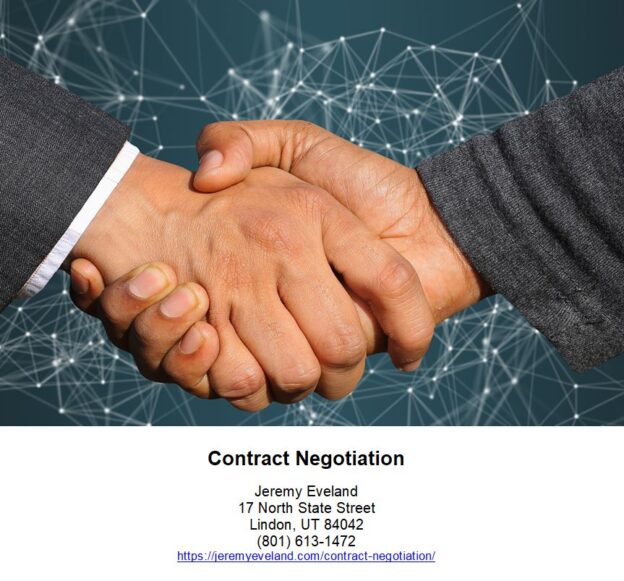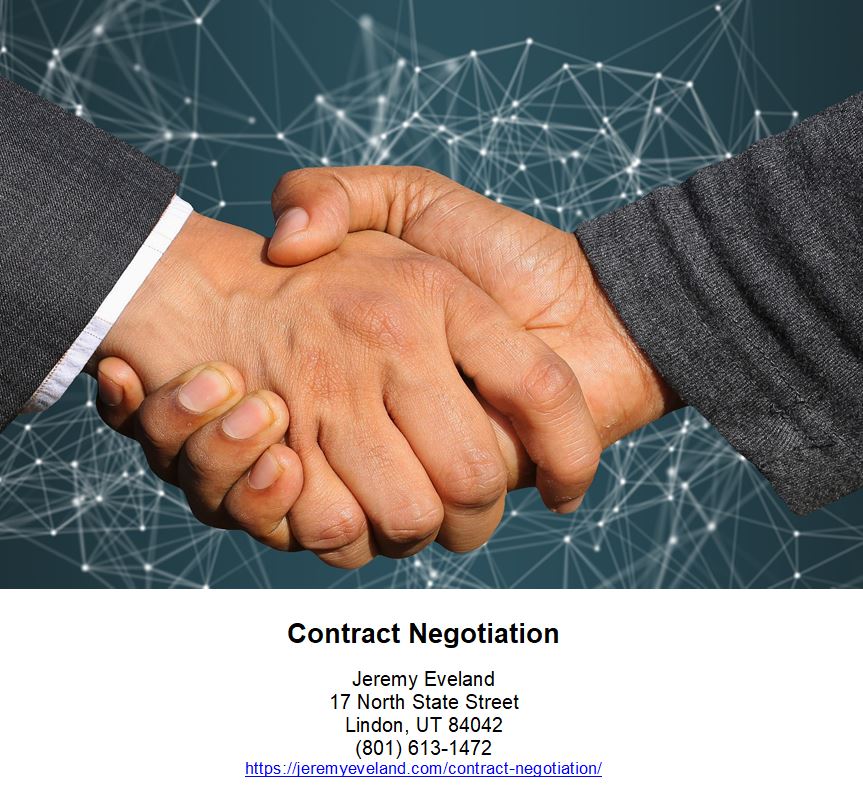Are you a business owner or a high net worth individual looking for effective strategies to negotiate your contracts? Look no further. In this article, we will reveal some valuable insights that will empower you to negotiate contracts with confidence and success. Whether you are entering into a new partnership, vendor agreement, or lease agreement, knowing how to navigate contract negotiations is essential. Get ready to discover proven strategies that will help you protect your interests and achieve favorable outcomes. At the end of this article, we will address some frequently asked questions to provide you with even more clarity and guidance. So, let’s dive in and uncover the secrets of effective contract negotiation!
Understanding the Basics of Contract Negotiation
Contract negotiation is the process of reaching an agreement between two or more parties on the terms and conditions of a contract. It involves discussions, compromises, and mutual understanding to ensure that both parties are satisfied with the final outcome. A well-negotiated contract can protect your interests, avoid disputes, and establish a foundation for a successful business relationship.
Importance of effective contract negotiation
Effective contract negotiation is vital for several reasons. Firstly, it enables you to establish clear expectations and objectives for the contract. By clearly defining the terms and conditions, you can prevent misunderstandings and minimize potential conflicts in the future. Secondly, negotiation allows you to protect your interests and ensure that the contract is favorable to you. This includes factors such as pricing, delivery timelines, warranties, and intellectual property rights. Lastly, effective negotiation helps build trust and rapport between the parties involved, fostering a positive working relationship.
Common challenges in contract negotiation
While contract negotiation can be a beneficial process, it also comes with its fair share of challenges. One common challenge is the clash of interests between the parties involved. Each party may have differing priorities or goals, making it essential to find a compromise that meets both parties’ needs. Additionally, negotiating parties may face difficulties in understanding, interpreting, or agreeing on certain contract terms and conditions. Furthermore, negotiations can become adversarial if one party employs aggressive tactics or fails to communicate effectively. It is important to be aware of these challenges and employ strategies to overcome them.
Preparation Stage
Before entering into contract negotiations, it is important to thoroughly prepare to increase your chances of success.
Setting objectives
Clearly define your objectives and desired outcomes for the contract negotiation process. Consider factors such as pricing, contract terms, and any specific requirements you may have. Having a clear vision of what you hope to achieve will provide you with direction and focus during negotiations.
Researching the other party
Gaining a comprehensive understanding of the other party’s background, interests, and objectives is crucial to negotiating effectively. Research their industry, market position, and current challenges. This information will help you identify areas where you can create value and potential opportunities for collaboration.
Identifying potential deal-breakers
Anticipate any deal-breakers or non-negotiable terms that may arise during the negotiation process. This could include limitations on liability, termination clauses, or intellectual property rights. Identifying these potential stumbling blocks in advance will allow you to develop alternative strategies and options.

Building Rapport and Communication
Building rapport with the other party is vital for establishing trust and creating a positive negotiation environment.
Importance of building rapport
Building rapport can help facilitate open communication and a cooperative atmosphere. It involves finding common ground, showing empathy, and demonstrating a genuine interest in the other party’s concerns. By establishing a positive relationship, both parties are more likely to work collaboratively towards a mutually beneficial agreement.
Effective communication techniques
Effective communication is essential for successful contract negotiation. Clearly articulate your thoughts, using concise and unambiguous language. Pay attention to your tone and body language, as they can greatly impact how your message is received. Practice active listening by giving the other party your full attention and ensuring you understand their perspective before responding.
Active listening skills
Active listening is a crucial skill to develop during contract negotiation. It involves not only hearing the other party’s words but also understanding their underlying concerns and motivations. Validate their thoughts and feelings, ask clarifying questions, and restate their points to demonstrate your understanding. This will foster trust and help you address their needs effectively.
Negotiation Tactics and Strategies
To achieve a successful contract negotiation, it is important to employ effective tactics and strategies.
Win-win negotiation approach
Adopting a win-win negotiation approach focuses on creating value for both parties rather than trying to “win” at the expense of the other. Look for opportunities to meet both parties’ needs and explore creative solutions that satisfy everyone involved. This approach can lead to stronger, long-term business relationships.
Creating multiple options
It is essential to have various options and alternatives when negotiating a contract. This provides flexibility and allows you to explore different scenarios and outcomes. By having multiple options, you can maintain leverage during the negotiation process and increase the likelihood of finding a favorable agreement.
Leveraging time and information
Time and information can be powerful negotiation tools. By employing deadlines and timelines strategically, you can create a sense of urgency and motivate the other party to make decisions. Similarly, having valuable information and data can give you a competitive advantage and help you negotiate from a position of strength.
Understanding power dynamics
Recognizing power dynamics within a contract negotiation can help you navigate the process more effectively. Identify the strengths and weaknesses of both parties and consider how they may influence the negotiation. This will allow you to adapt your approach accordingly and leverage your strengths.
Negotiating hard points
During contract negotiation, there may be certain terms or conditions that are critical to your interests. These hard points are non-negotiable and require firmness in your position. Approach these points respectfully but assertively, providing clear justifications for your stance.
Legal Considerations in Contract Negotiations
Understanding the legal implications of contract negotiation is crucial for protecting your interests and ensuring compliance.
Common contract terms to consider
There are several contract terms that require careful consideration during negotiation. These include confidentiality clauses, dispute resolution mechanisms, termination rights, warranties, and indemnity provisions. Understanding these terms and their potential impact will help you negotiate more effectively.
Understanding legal implications
Contract negotiation involves legal considerations that must be taken into account. Ensure that you have a clear understanding of applicable laws and regulations relevant to your industry and the contract in question. This will help you avoid legal pitfalls and ensure compliance.
Use of fallback provisions
Fallback provisions, also known as “Plan B” options, are alternative provisions that can be implemented if negotiations reach an impasse. These provisions serve as a safety net and can help prevent disputes or the collapse of the contract. Consider potential fallback provisions in advance to mitigate risks and ensure a smoother negotiation process.
Finalizing the Contract
After successful negotiation, it is essential to finalize the contract properly.
Importance of documenting agreements
When an agreement is reached, it is crucial to document all terms and conditions in a written contract. This ensures that both parties have a clear understanding of their rights and obligations. A well-drafted contract can serve as a point of reference and provide protection in case of disputes.
Reviewing and revising the contract
Before signing the contract, carefully review all its provisions to ensure accuracy and consistency with the agreed-upon terms. Seek legal advice if needed to identify any potential pitfalls or areas of concern. Revise the contract as necessary to address any ambiguities or discrepancies.
Seeking legal advice
It is always advisable to seek legal advice from a qualified attorney during the contract negotiation process. A lawyer with expertise in contract law can provide valuable guidance, review the contract, and ensure compliance with applicable laws. Their expertise can help protect your interests and minimize risks.

Navigating Challenges and Impasses
Contract negotiation may encounter challenges and reach points of impasse. It is important to know how to address these situations effectively.
Dealing with difficult negotiators
Difficult negotiators can make the negotiation process challenging. Remain calm and professional, and avoid becoming confrontational. Listen actively, clarify misunderstandings, and attempt to find common ground. Consider involving a neutral third party, such as a mediator, to help facilitate the negotiation if needed.
Breaking deadlocks
Deadlocks occur when both parties are unable to reach an agreement on specific terms. In such situations, it is crucial to revisit the underlying interests and objectives of both parties. Explore alternative options, creative solutions, or compromise to break the deadlock and move forward.
Avoiding common mistakes in negotiation
There are several common mistakes that individuals make during contract negotiation. These include inadequate preparation, being too rigid in their position, failing to actively listen to the other party, and not seeking legal advice when necessary. Awareness of these mistakes can help you navigate the negotiation process more effectively.
Mitigating Risks and Ensuring Compliance
Mitigating risks and ensuring compliance with the contract are critical for a successful business relationship.
Identifying potential risks
Thoroughly assess potential risks associated with the contract and the business relationship. Consider factors such as financial risks, reputational risks, and risks associated with non-compliance. By identifying and addressing these risks proactively, you can minimize the potential negative impact on your business.
Including dispute resolution mechanisms
Including dispute resolution mechanisms in the contract is crucial to address potential conflicts. Consider alternative dispute resolution methods such as mediation or arbitration, which can provide a more efficient and cost-effective way to resolve disputes. Clearly define the process for dispute resolution to prevent unnecessary delays or disputes during the contractual relationship.
Complying with regulatory requirements
Ensure that the contract and the business relationship comply with all applicable laws, regulations, and industry standards. This includes compliance with data protection laws, consumer protection laws, employment laws, and any other relevant legislation. A failure to comply with legal requirements can lead to legal disputes, fines, and reputational damage.

Strategies for Negotiating Long-Term Contracts
Negotiating long-term contracts requires a unique approach and additional considerations.
Considering future contingencies
When negotiating long-term contracts, it is essential to consider potential future contingencies. Anticipate changes in the market, technological advancements, or regulatory developments that may impact the contract. Build flexibility into the contract to accommodate these changes and ensure its longevity.
Renegotiation and termination clauses
Include renegotiation and termination clauses in long-term contracts to provide flexibility and protect your interests. These clauses allow for modifications to the contract or its termination under specific circumstances. Clearly define the process and terms for renegotiation or termination to minimize potential disputes.
Addressing changes in circumstances
Long-term contracts may be subject to changes in circumstances that were unforeseeable at the time of negotiation. Include provisions that address the possibility of changes such as force majeure events, change in control of a party, or other significant events that may impact the contract. These provisions will establish a framework for addressing changes and ensure the contract remains fair and viable.
FAQs on Effective Contract Negotiation
What is the best approach in contract negotiation?
The best approach in contract negotiation is a win-win negotiation strategy. This approach focuses on creating value for both parties and aims to find mutually beneficial solutions. By fostering collaboration and exploring multiple options, you can build a strong foundation for a successful business relationship.
How can I protect my interests during contract negotiation?
To protect your interests during contract negotiation, it is crucial to thoroughly prepare, understand your objectives, and clearly communicate your needs and priorities. Conduct thorough research on the other party, anticipate potential risks, and seek legal advice when necessary. Building rapport, actively listening, and employing effective negotiation tactics can also help protect your interests.
What are common mistakes to avoid in contract negotiation?
Common mistakes to avoid in contract negotiation include inadequate preparation, being too rigid in your position, failing to actively listen to the other party, and not seeking legal advice when necessary. It is important to approach negotiations with an open mind, be flexible, and maintain professionalism throughout the process. Thoroughly reviewing the contract and seeking legal advice can also help avoid common pitfalls.
Remember, effective contract negotiation requires careful consideration, preparation, and strategic thinking. By understanding the basics of contract negotiation and employing effective tactics and strategies, you can achieve favorable outcomes, protect your interests, and establish successful business relationships. Seeking legal advice from a qualified attorney can provide valuable guidance and ensure compliance with applicable laws.








